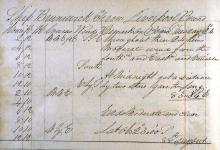Keeping a Logbook
On naval and merchant ships, navigators must keep a logbookLog logbook
1. Short for logbook, a document required to be kept by merchant and naval vessels. In the log must be recorded specific information relating to the navigation of the ship, the organization of her crew, and other activities on board.
Read More, even when a computer keeps track of position. Electronics fail, and a logbook is a record of more than course and distance; it is a place for recording weather and other ship’s business. Traditionally, the mateMate
In the merchant marine, the rank below master. Mates may be first, second, third, etc. kept the log on a merchant ship.
Recording time is the first step in keeping a log, with an entry every hour or every other hour, on the hour. Ship’s timeShip's time
Local apparent time which is reset every day at noon based on a noon sun sight. A ship's new day traditionally began at noon. is different from civilCivil time
Mean solar time with a day beginning at midnight at a fixed geographical location. To avoid confusion and set schedules, countries have adopted time zones, so that the time at a particular location is an average of the time within the zone. or land time, because the day begins at noon rather than at midnight. Each log entry has the vessel’s course, either as true or magnetic course. Speed is entered, sometimes followed by the distance traveled since the last logbook entry. Wind speed and direction follow, along with weather notes. On a sailing vessel, there could be notes on the managing of sails. At the end of each day’s entries, the ship’s position is recorded with a note that says how it was determined, by dead reckoningDead reckoning
Navigating by applying courses and distances made through the water from the last known observed position. The term dead could be a form of "ded" from "deduced" reckoning. only or by celestial navigationCelestial navigation
Using the sun, moon, stars, and planets to find your location.. Dead reckoning positions are needed even if a celestial observation is not made as it is needed to solve future celestial positions. A noon sight taken then can determine the vessel’s latitudeLatitude
Latitude is the measure of how far north or south one is from the equator. This angular measurement is given in degrees, minutes (1/60th of a degree), and seconds (1/60th of a minute) of arc.
Read More and together with a chronometer, longitudeLongitude
Longitude lines around the globe run north-south, and measure position east or west of a reference line.
Read More. Today, an electronic position would be noted.
The logbook is a legal document serving as record of the captain’s actions in case of a collision, grounding or other accident.

